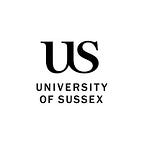“Sometimes it’s the small wins that make all the difference”
Callum Chapman has been elected as the new Students with Disabilities Officer for the University of Sussex Students’ Union.
I first became involved with the Students’ Union during my foundation year. I was having some trouble with housing, which led to me to seek support from the Support and Advocacy team at the Students’ Union. And I saw then how I could help to make a change. Through the SU I became a student rep, and that gave me the confidence to do more. I am also the student chair of the School of Global Studies, and I am a SU representative on Senate, one of the highest decision-making bodies in the University.
I advocate for students with visible and invisible disabilities and the issues they face. There’s a campaign, Access Sussex, which was started a few years ago. It had fallen by the wayside, but myself and the student welfare officer May Gabriel have reinvigorated it, alongside other students who care about the cause.
I am a disabled student myself. It’s one of the reasons why I took on the disabilities role — to help others who maybe don’t have the confidence themselves. But I don’t define myself by my condition. It is just part of who I am.
Physical access is a big issue because this isn’t a flat campus. Timetabling is a particularly difficult issue. Students are given ten minutes to get from one place to the next, which isn’t possible for some. It’s also difficult for students to get to some buildings, such as Ashdown House and the Freeman Centre, so we help to find solutions by speaking directly to the course convenors in the Schools.
As well as the physical issues, we take into account the mental health aspects of students with disabilities. They can feel quite isolated on campus, so we have created a network in which they can chat and make friends.
We now have a quiet room in Falmer House, which is where students with disabilities can chill out. It has sofas and dimmer switches so that you can have the lighting low, and weighted blankets that are really heavy so they reduce stress and anxiety, and a locked fridge for medication. What we say is that it’s for those who self-define with a disability. We try to avoid letting people play loud music. There is a code for the door but you can get it from the welfare officer, Falmer House reception, the student support unit or myself. Sometimes it’s the small wins that make a world of difference.
I am doing this role part-time, alongside my degree in International Relations. I’m really interested in conflict resolution, diplomacy, and the voices of disenfranchised groups. I came here because I knew Sussex had a good reputation in Global Studies. I’m also from Hove and I thought it would be good to have the support of my family locally.
I like being a vessel for the student voice and to direct what they are saying to the University management. I’ve had meetings with the Vice Chancellor, Adam Tickell, and the Pro Vice Chancellor for Students and Education, Kelly Coate, and they have said they are committed to listening to us and learning from us, and to having students with disabilities represented on working groups.
After my undergraduate degree I’d like to stay on to do a Masters, and I’m looking forward to continuing in my advocacy roles. In the beginning I found it quite daunting, but I had some supportive academic advisors, who helped me to get in involved. It’s all about having supportive people around you.
Interview by Jacqui Bealing
This profile is part of our This Sussex Life series.
Visit the University of Sussex website
